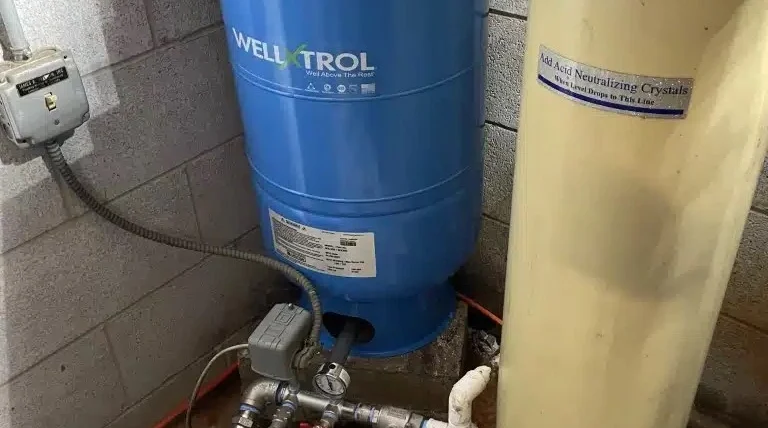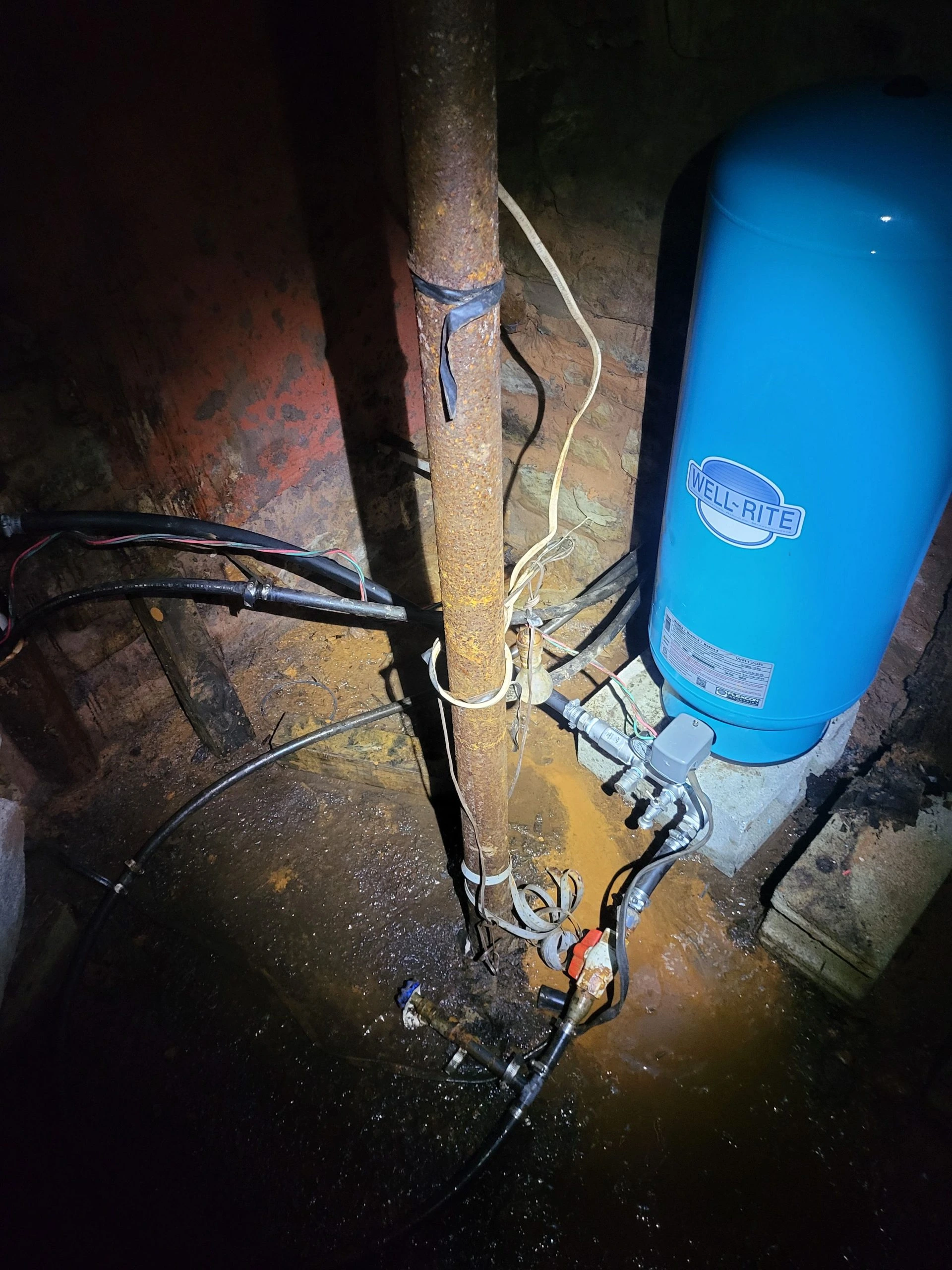
Introduction: Why a Healthy Well Pressure Tank Matters for Homes
If your home in Berks County relies on a private well for water, your well pressure tank is one of the most critical parts of your water system. It ensures you get a steady flow of water when you turn on a faucet, run the shower, or start the washing machine. A healthy tank not only maintains consistent water pressure but also prevents your well pump from running too often, which extends the life of your equipment.
Unfortunately, many homeowners don’t realize their well pressure tank is failing until they’re facing fluctuating water pressure, strange noises, or even a complete loss of water. Recognizing the early signs of a bad well pressure tank can save you from costly repairs, high utility bills, and major inconveniences.
Let’s break down what a pressure tank does, the common warning signs, and what you should do if you suspect yours is going bad.
What Is a Well Pressure Tank and How Does It Work?
A well pressure tank acts as a buffer between your well pump and the plumbing in your home. Here’s how it works:
- Inside the tank, there’s an air bladder that compresses when water fills the tank.
- This pressure pushes water through your home’s pipes without forcing the pump to run every time you turn on the tap.
- Once pressure drops below a certain point, the pump kicks on to refill the tank.
Think of it like a rechargeable battery for your water system. Without it, your pump would need to run constantly, which leads to wear, higher electric bills, and eventual pump failure.
Common Signs of a Failing Well Pressure Tank
Fluctuating Water Pressure
One of the first red flags is inconsistent water pressure. Maybe your shower stream starts strong but drops to a trickle in seconds, then comes back. Homeowners in Wyomissing and Sinking Spring often describe it as water “pulsing” while doing dishes or running sprinklers.
This happens when the air bladder inside the tank loses efficiency, so it can’t regulate pressure evenly.
Strange Noises from the Tank or Pipes
If you hear banging, hissing, or gurgling noises near your tank or pipes, it’s time to pay attention. In Boyertown, one homeowner noticed a “knocking” sound every time the washing machine filled—it turned out their pressure tank had internal damage, forcing the pump to short cycle.
Short Cycling of the Well Pump
A well pump that turns on and off rapidly—known as “short cycling”—is one of the most obvious well pressure tank problems. Instead of running smoothly for a few minutes, the pump clicks on and off every few seconds. This is a surefire sign the tank isn’t holding pressure properly.
Visible Leaks or Rust on the Tank
If you see water pooling around the base of the tank, rust spots, or even small pinhole leaks, your tank is likely at the end of its life. Corrosion weakens the metal and can cause sudden tank failure.
Air Spurting from Faucets
Turn on a faucet in Temple or Douglassville and notice bursts of air before the water flows? That’s not normal—it often means the bladder inside the tank has ruptured, letting air escape into your plumbing.
High Electric Bills from Overworked Pump
Since the pressure tank keeps your pump from running all the time, a failing tank forces the pump to work harder and longer. If you notice your electricity bill suddenly climbing without other changes, your tank may be to blame.

Problems Caused by a Bad Pressure Tank
Stress on the Well Pump
The number-one consequence of a failing pressure tank is pump damage. A pump that’s constantly short cycling can wear out years earlier than expected. Considering that replacing a well pump can cost $1,500–$2,500 in Pennsylvania, ignoring tank issues is an expensive gamble.
Reduced Water Flow in the Home
With an inefficient tank, you might struggle to run the shower and dishwasher at the same time. In Fleetwood and Kutztown households, this is one of the top complaints when tanks begin to fail.
Risk of Total System Failure
If left unchecked, a bad tank can lead to a complete loss of water. Imagine preparing for a family gathering only to discover you can’t get any water out of your faucets.
How Long Do Well Pressure Tanks Last?
On average, a well pressure tank lasts 8–15 years. Factors like water quality, tank size, and how often your pump cycles all affect its lifespan. In Berks County, where mineral-rich water can contribute to corrosion, tanks on the lower end of that range are more common.
Repair vs. Replacement: What’s the Best Option?
When Repairs Are Possible
Sometimes, repairs can extend the life of your tank. For example:
- Replacing a pressure switch.
- Adjusting the air pressure.
- Fixing small leaks in plumbing connections.
If your tank is relatively new and the issue is minor, repair may be the cost-effective choice.
Signs Replacement Is the Smarter Choice
Replacement is often smarter when:
- The tank is over 10 years old.
- The bladder has ruptured.
- Rust or leaks are visible.
- Your pump is short cycling continuously.
The cost to replace a well pressure tank in Pennsylvania typically ranges from $3,000 to $10,000, depending on size and complexity. While that might seem steep, it’s far cheaper than replacing a burnt-out pump plus a tank later.
Professional Well Tank Services in East Pennsylvania
At Berks Plumbing Specialist, we’ve helped homeowners across Berks County—from Birdsboro to Wyomissing-restore reliable water service with timely well tank repair and replacement.
Areas We Serve: Berks County Communities
We proudly serve Temple, Sinking Spring, Wyomissing, Birdsboro, Douglassville, Fleetwood, Kutztown, and Boyertown. No matter where you’re located in Berks, we can provide same-day emergency service for urgent water system issues.
Importance of Annual Maintenance
Just like your HVAC system or water heater, your well tank benefits from yearly checkups. During a maintenance visit, a professional will:
- Test the air charge.
- Inspect for leaks or rust.
- Check the pump’s cycling rate.
This small investment can help you avoid costly surprises down the road.
Why Choose Berks Plumbing Specialist for Well Tank Repair and Replacement
- Local expertise: We understand the water systems common in Berks County homes.
- Trusted service: Our licensed plumbers have decades of combined experience.
- Transparent pricing: You’ll know upfront what repairs or replacements will cost.
- Emergency availability: When water stops flowing, we’re just a call away.
Our mission is simple: to keep your family’s water supply consistent, safe, and stress-free.
Conclusion: Protect Your Home’s Water Supply with Timely Service
Your well pressure tank may not be visible during daily life, but when it fails, the impact is immediate. From fluctuating water pressure to short cycling pumps, the warning signs are clear if you know what to look for.
If you live in Berks County – whether in Temple, Sinking Spring, Wyomissing, Birdsboro, Douglassville, Fleetwood, Kutztown, or Boyertown – don’t wait until you lose water completely. Call Berks Plumbing Specialist for expert inspection, repair, or replacement. Acting early can save you money, extend the life of your pump, and keep your water supply running smoothly.
FAQs
How do I test if my well pressure tank is bad?
You can gently tap the tank – if it sounds hollow at the top but waterlogged at the bottom, the bladder may be damaged. Also, check if your pump is short cycling. For accurate diagnosis, have a professional test the air pressure.
What is the average cost to replace a well pressure tank in Pennsylvania?
Most homeowners spend $3,000 – $10,000 on a replacement, depending on tank size and installation complexity.
Can I run my well pump without a pressure tank?
Technically yes, but it’s highly discouraged. Without a tank, your pump will run nonstop, leading to rapid burnout and extremely high utility costs.

